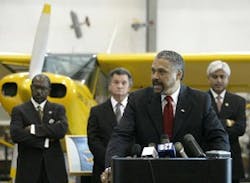Minority Groups Backing Wright Ammendment
Don O'Bannon of Dallas/Fort Worth Airport speaks Wednesday in favor of the Wright Amendment at Love Field in Dallas.
A repeal of the Wright Amendment could hurt minority-owned businesses in North Texas, a group of minority chambers of commerce said Wednesday.
Chamber officials said they feared eliminating the federal law could damage the area's economy. It could also endanger minority business contracts at Dallas/Fort Worth Airport, officials said.
"D/FW is one of the most significant economic resources in North Texas," said Dan Villegas, chairman of the Fort Worth Hispanic Chamber of Commerce, during a news conference at the Frontiers of Flight Museum at Dallas Love Field.
"It just makes good business sense to support the Wright Amendment," Villegas said.
D/FW officials distributed copies of a study, first released a year ago, showing that the airport spends more than $150 million annually on contracts with minority- and women-owned businesses.
Those contracts have generated more than $1 billion in regional economic activity, as well as 9,000 jobs, according to the study.
The airport paid $20,000 for the study, which was conducted by economists Bernard Weinstein and Terry Clower of the University of North Texas.
Six groups passed resolutions supporting the amendment: the Greater Dallas Hispanic Chamber, the Greater Dallas Asian American Chamber, the American Indian Chamber of Texas, the Dallas Black Chamber, the Fort Worth Metropolitan Black Chamber and the Fort Worth Hispanic Chamber.
Gene Bloomfield, chairman of the American Indian Chamber, called D/FW the "crown jewel of the region's financial system" and said the amendment is as important today as it was two decades ago.
"Contracts, like treaties, ought to be honored, not broken," he said.
The amendment, passed by Congress 26 years ago to protect D/FW Airport from competition, allows flights from Dallas Love Field only to adjacent states and Kansas, Mississippi and Alabama.
That means Southwest Airlines, which operates solely from Love, cannot offer service -- and its signature low fares -- to distant cities. It also effectively gives Fort Worth-based American Airlines a near-monopoly on many long-haul routes from D/FW. Southwest has said it doesn't want to fly out of D/FW.
Last year, Southwest executives began pushing to have the amendment repealed, blasting it as unfair and anti-competitive and saying lower fares would boost the region's economy.
Officials with D/FW Airport and American Airlines argue that if the restrictions are lifted, the airport could suffer as flights are shifted to Love Field. That, they argue, could hurt the regional economy, which they say depends on the larger airport for its growth.
Southwest executives said Wednesday that they were disappointed by the position of the minority chambers.
"We think that if the Wright Amendment is repealed, those businesses will only benefit in terms of economic development," said Ed Stewart, a Southwest spokesman. "We'll have more people coming to North Texas wanting to do business here."
But, he added, "I understand that they're trying to protect some pretty good contracts they have with D/FW, and that's understandable."
Airport officials, meanwhile, maintained that lifting the law could do significant damage to minority-owned businesses. They said that Southwest could bring competition and low fares to the region by moving operations to D/FW.
"Nobody cares more about competition and the free market than these businesses," said Don O'Bannon, the airport's vice president of small and emerging businesses. "Our communities deserve having Southwest Airlines at D/FW."
The minority chambers said they polled members on the issue and heard a strong response in favor of keeping the amendment. All of the groups met with D/FW Airport officials to discuss the amendment.
Only one group, the Greater Dallas Hispanic Chamber, said it met with Southwest officials.
Stewart said Southwest has scheduled several meetings this summer with minority business groups.
In Washington, Rep. Eddie Bernice Johnson, D-Dallas, told the Star-Telegram that she wants to arrange a meeting between the mayors of Fort Worth and Dallas to settle differences over the Wright Amendment.
She said she has been in contact with the municipal leaders, but no date has been set.
Johnson said she has not taken a position in the Wright Amendment debate, saying "there are good points on both sides."
Dallas Mayor Laura Miller said she supports a meeting with elected officials to seek a solution to the Wright Amendment issue. "A local solution is best," she said.
Johnson had earlier suggested a meeting that would include the leadership of American and Southwest. But she said on Wednesday that she has scrapped that idea because it could violate federal antitrust rules.
Gerard Arpey, chief executive of American Airlines, agreed. "I don't think the Justice Department or the Transportation Department would look favorably upon us being in the same room with Southwest Airlines," he said.
Arpey was in Washington along with more than 300 American Airlines executives and workers to tout the company's position on pension rules. But Arpey said he also used his visits with House and Senate members to "weigh in" with the company's opposition to repealing the Wright Amendment.
Star-Telegram Washington Reporter Dave Montgomery and Staff Writer Nathaniel Jones contributed to this report.
